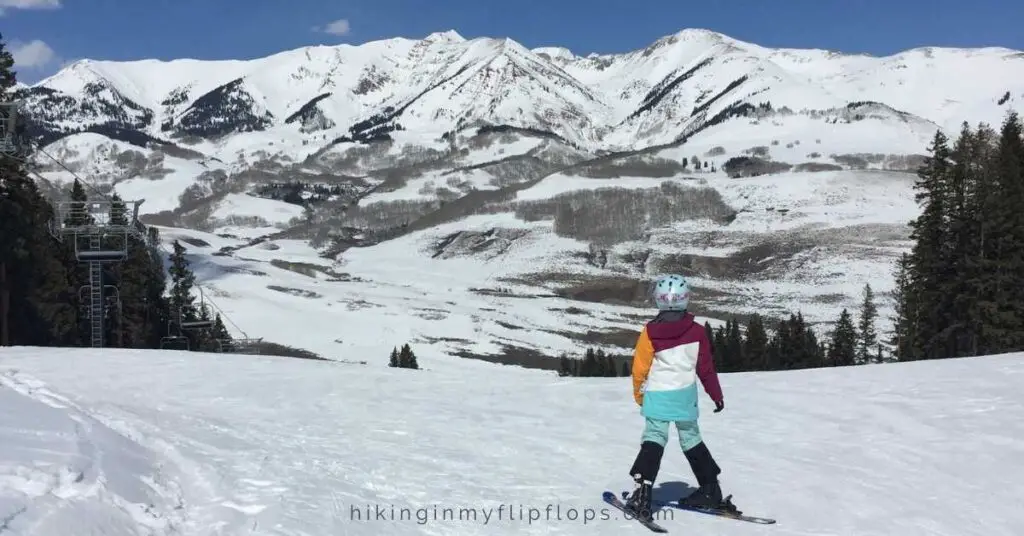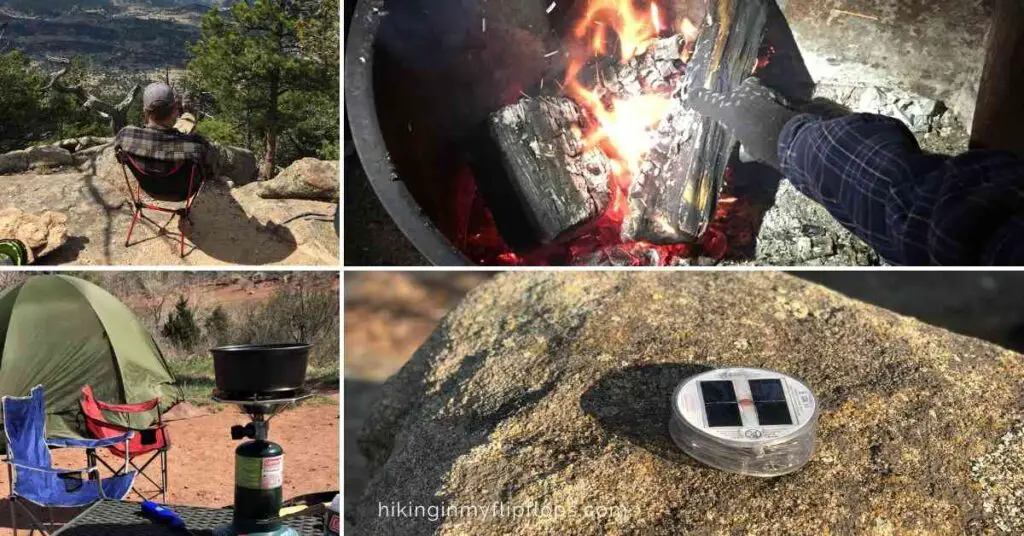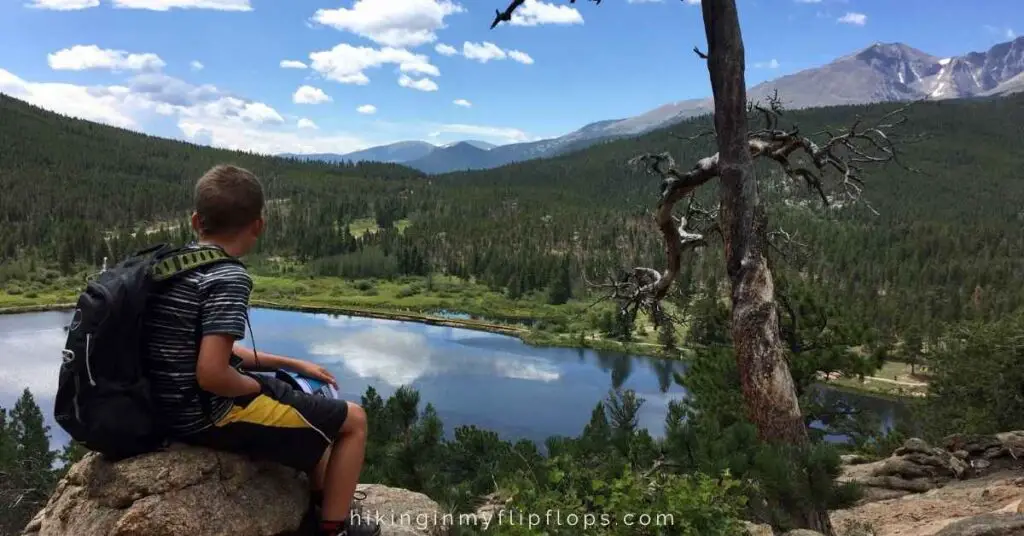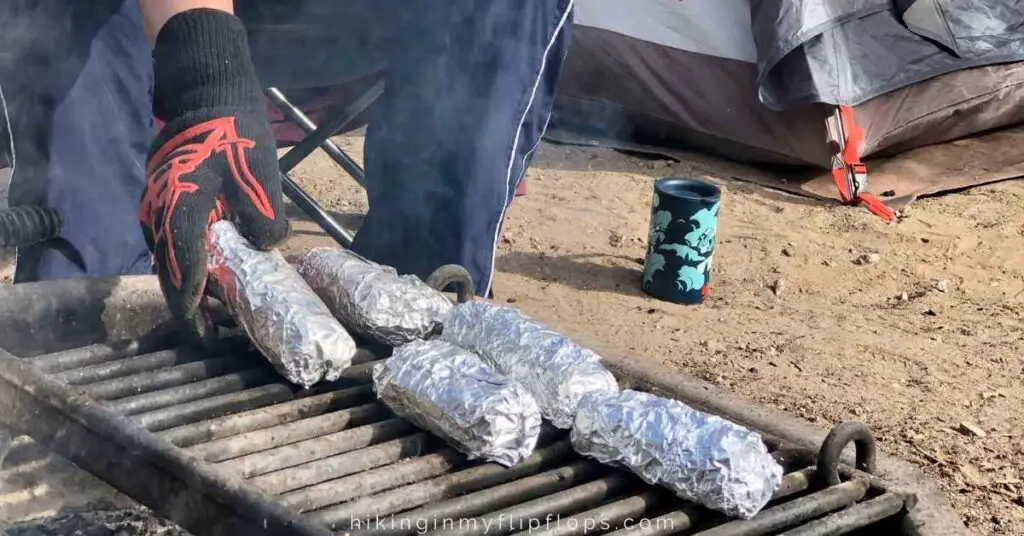We’ve always camped a lot. After taking more camping trips than we can count, we always assumed we had things pretty well figured out when tent camping. But on our first camping trip in the Colorado mountains, there was something new: a bear-safe food storage locker at our campsite.
That trip marked the beginning of our lessons on camping in bear country.
(This post may contain affiliate links. Please read our disclosure policy for more information.)
Camping can still be a fun and safe adventure in bear country – if you take the proper precautions and prepare. We’ve put together these tips for staying safe from bears while camping to keep you and the bears safe. Read on to find out how to protect your campsite from bears and what to do if you encounter a bear.
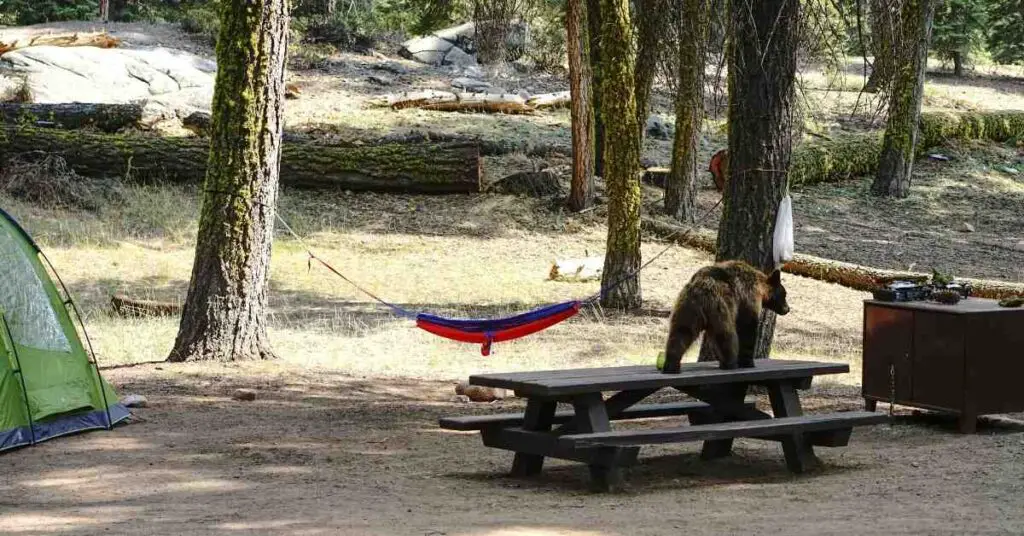
Car Camping in Bear Country
These tips are primarily geared for family camping at a designed campground where you have your car nearby but apply to other types of camping, too, from backcountry to glamping. And because our experience is camping in areas where black bears live, this guide primarily applies to black bears.
If you’re camping in areas with grizzly bears or brown bears, read these additional tips from the National Park Service.
And these tips don’t only keep you, your family, and your pets safe – they also keep the bears safe. Bears who learn to depend on human food sources become a risk to people and are frequently put down by wildlife control.
It’s rare for bears to attack without being provoked. Bears are generally interested in food, protecting their cubs, and protecting their space. They naturally don’t want anything to do with humans; they are usually looking for food or an easy meal.
Backpacking, or hiking to your campsite, can be a little bit different from car camping in bear country. REI has some great tips on how to protect yourself from bears when camping in the backcountry:
How to Keep Bears Away From Your Campsite
These tips for staying safe from bears while camping focus on not attracting them to your site. Simply put, bears are looking for food. The best way to avoid unwanted bear encounters is to not lure them to your campsite with enticing aromas and scents. You can’t always rely on a busy campground to keep bears away like those in national parks.
1. Clean Up After Each Meal
Leftover scraps of food stuck on plates and cookware leave a scentthat can be picked up by a bear’s keen sense of smell. Get all cookware and dishes washed, dried, and put away after each meal. A clean campsite is less attractive to bears looking for an easy snack (this will also work to keep other critters like mosquitoes away). Ensure you wash everything with hot water before putting them away into totes or bags.
Related Reading: 19 Common Camping Mistakes We All Make (and How to Avoid Them)
Dispose of greywater away from your campsite, so nothing you washed off of the dishes stays near your site.
2. Don’t Store Anything in Your Tent that Has a Scent
Anything scented should be kept in a bear locker, car, or other space away from your tent. We call these “smellables” and include food and toiletries—store scented items like toothpaste and sunscreen anywhere other than your tent. And even if you can’t smell it, the bears may be able to.
Our family camping rule is to store only clothes, bedding, books, and flashlights in our tents. Anything else goes in the bear locker or car.
If you’re backcountry camping or otherwise camping away from your car, you can keep “smellables” in a bear-proof container or hang it high on a tree branch. Bears are well known for their ability to smell and seek out any food, so you want to make sure they aren’t able to get easy access to your supplies.
, Amazon, and sell bear canisters. BearVault makes an excellent canister that many backcountry campers rely on.
3. …Including the Clothes You Cooked In
The exception to our rule about what can go into our tent while camping in bear country is the clothes we cooked in. Those delicious outdoor meals you cook over the fire can pick up scents from cooking, giving bears something to follow and track down food. You don’t want them clawing their way into your tent, thinking there is food there.
4. Keep the Fire Pit Clean
Cooking food over the campfire can spill or fall into the fire, leaving something for bears to find. Make sure to wipe up where the pot of spaghetti boiled over and the burned marshmallow fell in.
5. Avoid Setting Camp Up By Berry Bushes
Bears forage for berries in berry bushes, and they may come foraging around your tent site. Try to find a place away from berry bushes, clear any brush and leaves, and rake the ground before pitching your tent. This helps ensure there is nothing at your campsite for curious bears to scavenge.
6. …and Camping Too Close to Water Sources
You should generally avoid camping too close to water sources. One of the reasons is to allow wildlife to have unobstructed access to water sources. This includes bears, and you don’t want to set up camp between you and a thirsty bear.
7. Lock Car Doors and Cover Up the Coolers
After that first time camping in bear country, we knew to look for bear lockers at the campsite. But the next campground we went to didn’t have them, so we called the rangers after hearing about a bear getting into a car at that campground. She told us that we would be just as safe to keep smellables in a locked vehicle in airtight containers or coolers and covered with a blanket.
Bears know how to open car doors, so unlocked doors give them easy access to what they are after. Some people believe that keeping the doors unlocked will prevent damage to your vehicle, but bears getting to our food does even more harm for the bear.
That ranger also told us that bears have learned to recognize coolers, so it’s essential to keep them concealed in your car.
8. … or Keep These Items Far From Your Tent
If you’re not camping at a designated site, pitch your tent at least 100 yards away from where you’re cooking and storing food so you’re not in harm’s way of a bear trying to get through the barriers to your food.
9. Don’t Leave Food Unattended at Your Campsite
Food left out after meals, coolers sitting out in the open, and groceries left in the tent while you’re out exploring can attract bears or other wildlife. And they’ll keep coming back when they’re rewarded with finding food (including pet food), hoping to find more.
Like Moraine Park Campground in Rocky Mountain National Park, some campgrounds issue fines to campers who leave coolers unattended at their campsite. They take protecting wildlife seriously, so pay attention to the posted rules.
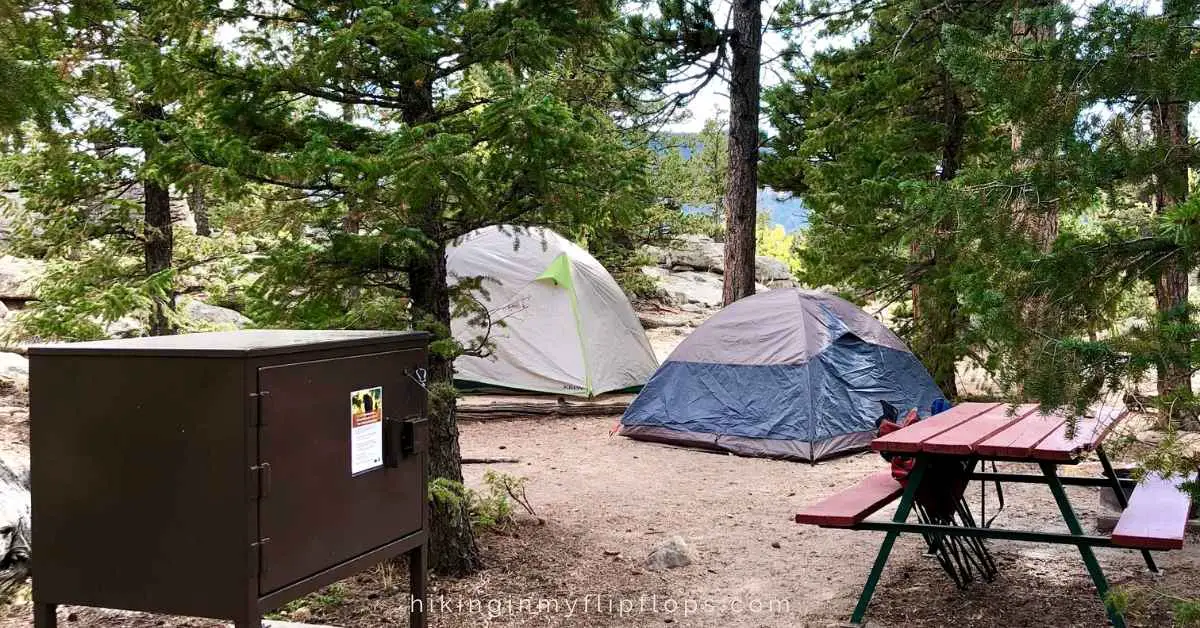
Tips for Avoiding Bear Encounters
These tips on staying safe from bears while camping help reduce the risk of a bear attack when you are away from your campsite.
10. Make Some Noise Out on the Trails
When you head out for a hike or other camping activity, let the bears know you’re there with bear bells, loud conversation, and singing. The loud noises will help send bears in the opposite direction from the humans.
11. Never Approach a Bear Cub
There’s a reason that moms protecting their kids are called “mama bears.” Bears cubs may be adorable and seem harmless, but they likely have their mothers nearby – and mama bears aren’t cute or harmless when protecting their babies.
Related Reading: The Ultimate Guide to Tent Camping for Beginners for an Epic First Trip
If you see a black bear cub, leave the area. Back away slowly while watching for the mother so you don’t find yourself between the mom and her cubs.
12. Get Advice from Park Rangers or Campground Hosts
The most knowledgeable people are those who are around the bears every day. Talk to the rangers or hosts to get any advice or information they have on recent bear activity spots around the campground where they like to hang out.
13. Keep Pets on a Leash When Camping in Bear Country
While it’s always safest to keep your pets leashed while hiking and camping, it’s essential when camping in bear country. Curious dogs risk being attacked when they wander off into the woods and encounter a bear.
Whether hiking or relaxing at your campsite, pets are always safer on a leash.
14. Avoid Getting Out Around Dawn and Dusk
Bears are most active at dusk and dawn, so try to plan your hikes during the daytime hours and stick close to developed paths.
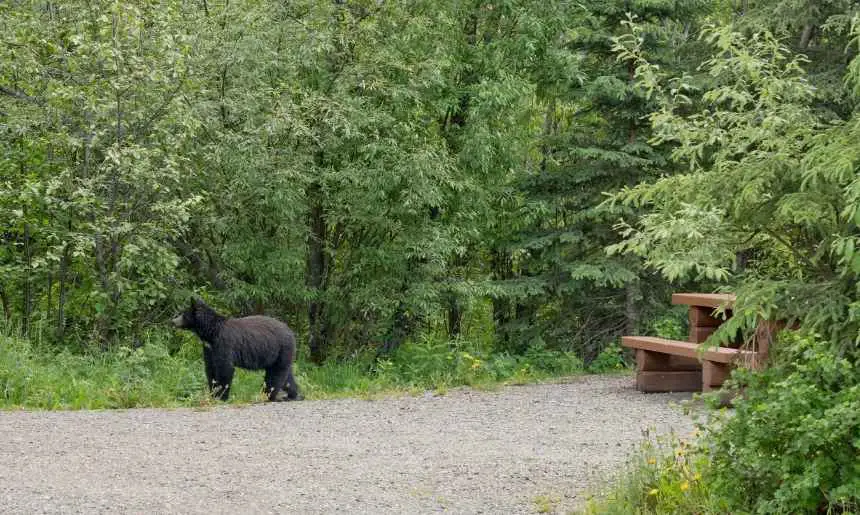
How to Protect Yourself From Bears When Camping or Hiking
Even if you follow all the advice for deterring bears, you may still encounter one. Arm yourself with some basic knowledge of protecting yourself from bears while camping or hiking.
15. Bring Bear Spray
Bear spray can be a great line of defense when a bear is too close but use caution. It should only be used in emergencies and never sprayed around a campsite as a bear deterrent. It works like mace, not like bug spray (in fact, the scent of bear spray may even attract bears if sprayed all around your campsite).
If you bring bear spray, keep it within arm’s reach in the tent at night, with a flashlight close by.
Bear spray is available at , Amazon, and (this one from Walmart comes with a practice canister to better prepare for using bear spray in an intense situation).
16. If You Do See a Bear, Back Away Slowly
In the case of a bear sighting, stay calm and don’t run. Back away slowly, make noise, and try to scare it away by making yourself look big. Throw rocks or sticks at the bear while yelling or shouting. Pick up small children or pets to protect them.
17. …but Do Not Play Dead
If a black bear attacks, do NOT play dead. Fight back to protect yourself.
You Can Stay Safe While Camping in Bear Country
There’s no need to avoid bear country for your next camping adventure. Even if your camping adventure is a little more glamping, follow these bear safety tips and stay diligent about keeping your campsite clean and scent-free, and bears will have little to no interest in your campsite.
If you camp in bear country, remember these tips and advice on staying safe from bears while camping!
Click below to save these tips on staying safe from bears while camping on Pinterest!

